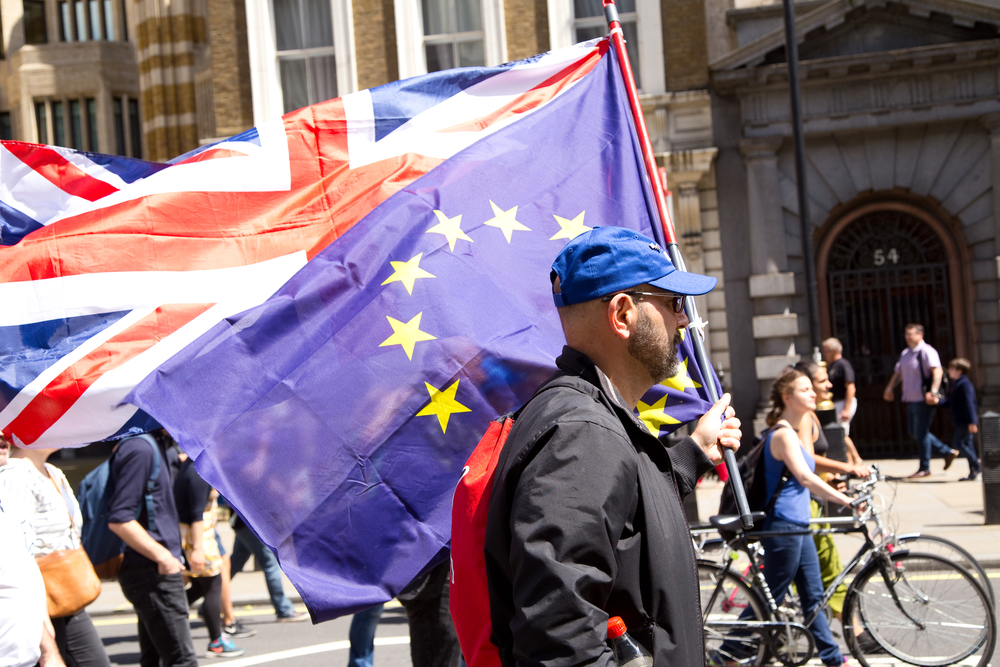Photo: LONDON, UK - July 2, 2016: Protesters at the March for Europe protest on July the 2nd, 2016 in London, England, UK. An estimated 35 thousand attended the march / Michaelpuche / Shutterstock.com
Uncertainty over the United Kingdom’s trading future as the country prepares to exit the European Union is pushing one halal meat retailer to more actively seek new markets while a lamb slaughterhouse continues to take a ‘wait and see’ approach.
A sweeping climate of uncertainty hangs over the future of UK trade and its halal meat industry. The coming Brexit negotiations are set to wrangle over acknowledging voters' desire to see a reduction in EU immigration, while ensuring British businesses can trade as freely as possible with its nearest neighbors.
HOLDING FIRE
Imran Kausar, founder and managing director of London-based halal meat brand Haloodies, said that the Brexit outcome has caused some producers to hold fire on capital investing as they rely upon exporting into the European Union.
”Brexit has introduced doubt across the board; other than inflationary driven costs, the impact on consumer behaviour and recessionary concern will have short-term effects,” Kausar told Salaam Gateway.
He expects some consolidation in the market in the mid-term as companies struggle and others take the opportunity to grow at a low cost. From a consumer perspective, he said there may be gain in terms of getting access to more UK produce, especially halal poultry which is currently imported in large amounts from the EU as there is insufficient production of poultry in the UK.
“There is likely to be an increase in prices in the medium term, which will disproportionately affect the halal consumer in the UK. The UK is also still subject to EU quota rules so cannot replace poultry coming in from Europe,” said Kausar.
Addressing the two issues, Alan Rownan, ethical labels analyst at Euromonitor International, said, “There is the possibility that a future disorderly Brexit coupled with short term currency fluctuations in the interim could potentially drive up prices, but this is largely speculative at this early stage.
“The industry consensus on halal beef is that there is growing demand in the UK and, in a similar fashion to poultry, a possible disconnect with the EU could leave the UK unable to satisfy this,” added Rownan.
|
RELATED How can the UK halal food industry win in a post-Brexit world? |
PRODUCTION UNCERTAINTY
One of Europe’s largest Muslim-owned lamb slaughterhouses, Euro Quality Lambs, is taking a ‘wait and see’ approach amid concerns about Brexit effects on the market. “Our plan was to build a state of the art facility to push the product in the UK and Europe – we’ve taken a pause on that to see how the Brexit negotiations will turn out,” the company’s director, Rizvan Khalid, told Salaam Gateway.
UK-based Khalid added that the specific type of deal that the British government negotiates with the EU would be crucial to mitigating damage on the meat trade. “No one actually knows what Brexit means, but if [the British government] can still do a deal to have access to a single market this will be crucial for us.”
Khalid currently oversees the processing of up to 15,000 carcasses a week at Euro Quality Lambs’ Shropshire plant. He said 70 to 80 percent of his carcasses are currently shipped to European countries such as Belgium, France, Germany, and Portugal.
“Our customers are now concerned about barriers to trade and the costs involved. We are doing everything we can to push to keep the trade links as open as possible, including lobbying our local MPs.”
He also expressed concern at the potential removal of EU farmer subsidies and the fact that the UK’s halal meat trade relies heavily on an Eastern European workforce. “If that supply was cut off, our costs would increase considerably.”
NEW MARKETS
According to Euromonitor’s Rownan the act of realigning domestic processing and production to accommodate the UK halal demand could be a viable long-term strategy and help to mitigate the uncertainty that has manifested itself in the wake of the UK’s decision to exit the EU.
“The wiser decision however,” he said, “may be to delay prematurely reacting to the uncertainty and instead wait to see what form of Brexit will actually come about when article 50 is triggered.” Article 50 refers to the formal notification that must be officially given to the European Union to start the process of a country leaving the bloc.
With Euro Quality Lambs “taking a pause” on building a new facility to push its products in the UK and Europe, Khalid confirmed that the company is considering Ireland to establish a foothold in the EU.
Meat retailer Haloodies, however, is looking farther afield.
“We look at things from a global perspective. We are looking more closely at the Middle East markets and beyond that,” said Kausar.
“We need to make sure we have appropriate regulatory channels. We’ve started reaching out to the British Chamber of Business out in the Middle East - Department for International Trade,” said Kausar.
(Additional reporting by Haroon Latif)
© SalaamGateway.com 2016 All Rights Reserved


Alicia Buller